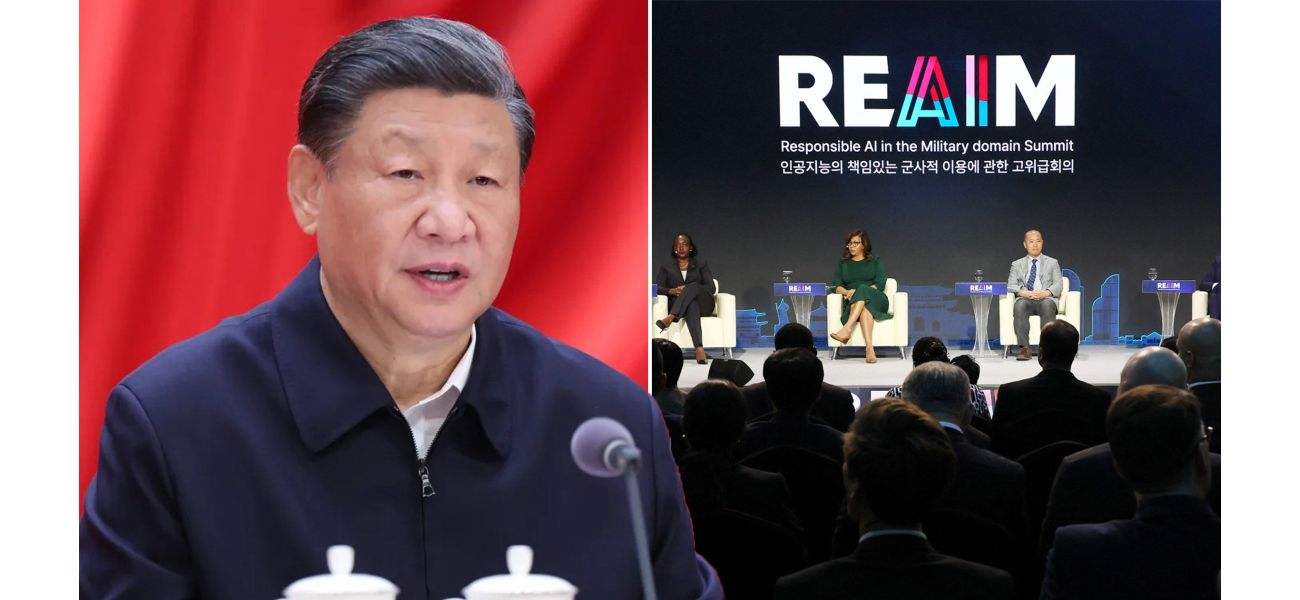China declined to sign treaty preventing use of AI in nuclear weapons
At the summit, Russia was absent.
September 10th 2024.

At the recent summit in Seoul, South Korea, China made the decision to not sign an important agreement. This agreement addressed the use of artificial intelligence (AI) in controlling nuclear weapons, a topic that has been causing concern and debate around the world.
The thought of AI having the power to potentially end life on our planet is a frightening one. And with China's refusal to sign this agreement, that possibility may be one step closer to becoming a reality. The summit, called Responsible AI in the Military Domain, was attended by representatives from around 100 countries, all coming together to discuss this pressing issue.
The agreement, which was hosted by the UK, the Netherlands, Singapore, and Kenya, was not legally binding. However, it stressed the importance of human involvement in decision-making when it comes to the use of nuclear weapons. The declaration also emphasized the need for ethical and human-centric AI applications, and the importance of adhering to national and international laws.
Despite the efforts of the summit and the concerns expressed by other countries, China chose not to sign the agreement. This was met with disappointment and concern, as the potential consequences of AI-controlled nuclear weapons are immense. The Chinese embassy in Seoul did not provide any comment on their decision.
The summit also discussed the need for clear policies and procedures surrounding the use of AI in the military, as its capabilities continue to grow. South Korean Foreign Minister Cho Tae-yul delivered a speech at the summit, highlighting the importance of further discussions on this matter.
It is no secret that conflicts and tensions are rising around the world, making the threat of nuclear war a very real possibility. The decision to not invite Russia to the summit due to their actions in Ukraine only adds to this concern. South Korea's defense minister, Kim Yong-Hyun, acknowledged the potential benefits of utilizing AI in the military, but also warned of the dangers of misusing such technology.
This summit, which builds upon a previous event held in The Hague last year, aims to be the most comprehensive and inclusive platform for addressing the use of AI in the military domain. As we continue to navigate through this rapidly advancing technological age, it is crucial that we carefully consider the implications of AI in warfare and work towards responsible and ethical measures.
The thought of AI having the power to potentially end life on our planet is a frightening one. And with China's refusal to sign this agreement, that possibility may be one step closer to becoming a reality. The summit, called Responsible AI in the Military Domain, was attended by representatives from around 100 countries, all coming together to discuss this pressing issue.
The agreement, which was hosted by the UK, the Netherlands, Singapore, and Kenya, was not legally binding. However, it stressed the importance of human involvement in decision-making when it comes to the use of nuclear weapons. The declaration also emphasized the need for ethical and human-centric AI applications, and the importance of adhering to national and international laws.
Despite the efforts of the summit and the concerns expressed by other countries, China chose not to sign the agreement. This was met with disappointment and concern, as the potential consequences of AI-controlled nuclear weapons are immense. The Chinese embassy in Seoul did not provide any comment on their decision.
The summit also discussed the need for clear policies and procedures surrounding the use of AI in the military, as its capabilities continue to grow. South Korean Foreign Minister Cho Tae-yul delivered a speech at the summit, highlighting the importance of further discussions on this matter.
It is no secret that conflicts and tensions are rising around the world, making the threat of nuclear war a very real possibility. The decision to not invite Russia to the summit due to their actions in Ukraine only adds to this concern. South Korea's defense minister, Kim Yong-Hyun, acknowledged the potential benefits of utilizing AI in the military, but also warned of the dangers of misusing such technology.
This summit, which builds upon a previous event held in The Hague last year, aims to be the most comprehensive and inclusive platform for addressing the use of AI in the military domain. As we continue to navigate through this rapidly advancing technological age, it is crucial that we carefully consider the implications of AI in warfare and work towards responsible and ethical measures.
[This article has been trending online recently and has been generated with AI. Your feed is customized.]
[Generative AI is experimental.]
0
0
Submit Comment





